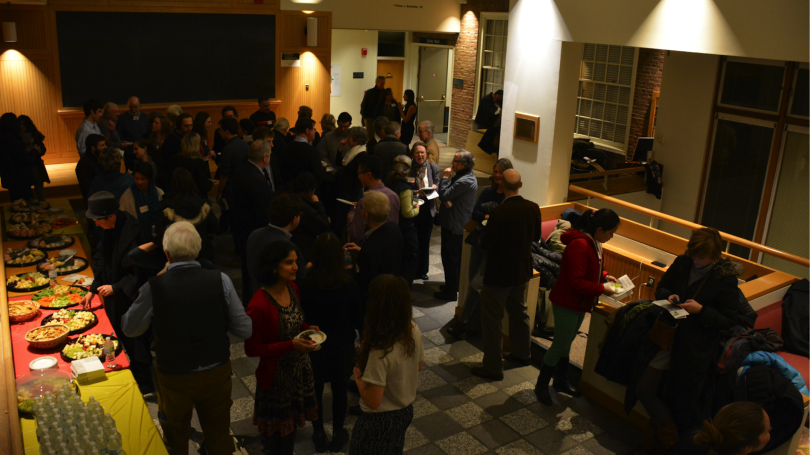
Menu
- Public Policy
- Leadership
- Funding
- News & Events
- About the Center
Back to Top Nav
Back to Top Nav
Back to Top Nav
Back to Top Nav
“A Place for the Displaced,” the fourth annual symposium put on by Geisel’s chapter of Physician for Human Rights, the Nathan Smith Society, and the Dartmouth Coalition for Global Health explored the issue of refugee health. The two-day event was a chance to foster discussion around the current Syrian refugee crisis and to shed light on the pockets of refugees living in communities near us such as Manchester, Concord and Burlington. The program followed the journey of migrants around the world; we began by examining of the global context of forced migration, then moved on to exploring refugee camps and refugees’ immediate health needs, and closed the day by looking at process of resettlement within the U.S.
The event kicked off Friday with an evening devoted to the arts and media. James Nachtwey, acclaimed photojournalist, opened the symposium with a moving presentation of his photography documenting the massive migration occurring across Europe, narrating the upheaval he had witnessed. A screening of the documentary “Salam Neighbor” followed, telling the story of a handful of residents in the Za’atari refugee camp for Syrian refugees in Jordan, setting the stage for participants to delve deeper into the complexities of health issues related to migration the next day.
Saturday opened with Ambassador Roland Kuchel and Dr. David Sussman clarifying the definitions of refugee, asylum seeker and immigrant; providing an overview of the current European refugee crisis; and examining key health issues for refugees in camps and cities. Dr. Amer Al-Nimr, Geisel assistant professor of medicine and pediatric gastroenterology, then shared the story of his own work providing health care and establishing a gastrointestinal clinic in refugee camps in Jordan. The morning concluded with a case study in which symposium participants attempted to solve some of the current issues in the field, with sessions focusing on engineering, health, human rights, economics and government.
The afternoon was devoted to looking more closely at the process of resettlement in the U.S., focusing specifically on the realities and challenges of the legal system and the implications seen for long-term health. Kate Semple-Barta and Erin Jacobsen, two local attorneys, uncovered the tangle of legal challenges faced by individuals seeking asylum or refugee status in the U.S. Participants heard from Dr. Paul Geltman and Dr. Paula Mahon, physicians who have worked extensively with refugee populations in Boston and Manchester, respectively. A panel with Drs. Yvonne Kwan, Sara Mostafa and Karen Fondacaro discussed the mental health needs of internally displaced people, refugees and asylum seekers from the sociological, medical and psychological perspective. Kim-Yen Vu reflected on her time as a case manager for refugees newly arrived in the U.S., and told about the journey new arrivals face from arriving at the airport to finding a job, establishing a home and integrating into a new country. Manchester photographer Becky Field displayed her work, illustrating new Americans finding and defining a new home for themselves in New Hampshire.
The event saw over 100 attendees both on Friday and Saturday, with an engaged audience of students, faculty and community members, including many individuals who had their own stories of forced migration or who are now professionally involved in providing health, legal or social services to refugee populations. The symposium's goal was to provide the technical tools for meaningful discussions during the event, and to provide the audience with concrete skills and knowledge to perpetuate productive conversations and projects outside of the symposium.
-Submitted by faculty advisors Lee Witters and Sarah Johansen